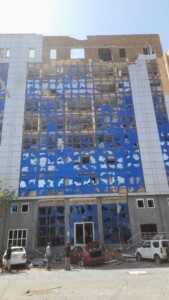UN Security Council extends mandate of Sudan Panel of Experts
The UN Security Council (UNSC) has issued a unanimous decision to extend the mandate of the Panel of Experts assisting the Sudan Sanctions Committee until March 12 next year. The decision is based on a report from Secretary-General António Guterres containing the following four main criteria concerning the progress made in: political and economic governance, Transitional Security Arrangements in Darfur, the National Plan for the Protection of Civilians, and Transitional Justice and Accountability.
 The UN Security Council (Photo: UN)
The UN Security Council (Photo: UN)
The UN Security Council (UNSC) has issued a unanimous decision to extend the mandate of the Panel of Experts assisting the Sudan Sanctions Committee until March 12 next year. The decision is based on a report from Secretary-General António Guterres concerning the progress made in the following four main criteria: political and economic governance, transitional security arrangements in Darfur, a national plan for the protection of civilians, and transitional justice and accountability.
In its report to the security council in December last year, the Group of Experts emphasised that “the overall situation in Darfur remains very fragile” and that many areas “have witnessed widespread violence and a deterioration in the security situation, which has been described as the worst in recent years.” The violence included incidents of sexual assault and rape of women and girls.
The report pointed out the slow implementation of the Juba Peace Agreement, especially with regards to security arrangements and minimum provisions for the displaced, among other things.
As Radio Dabanga highlighted earlier this month, the annual report by the UN Panel of Experts to the Security Council that was presented last week highlighted the fact that mercenary activities in Libya, funded by the United Arab Emirates, had been the major source of financing for most Darfur movements. "However, due to international pressure and diminished pay-out from Libyan counterparts, the signatory movements progressively returned to Darfur", the report stated.
It was further explained that some members of the armed groups in Darfur profited from local and cross-border criminal activities and that the artisanal gold mines in Jebel Marra were a major source of financing for SLA/AW.
The report confirmed that "the activities of Sudanese mercenaries funded by the UAE in Libya and also confirms the continued violation of the arms embargo last year by transferring weapons and other types of military equipment to Darfur”.
It was added that the five main movements, the Sudan Liberation Army-Minni Minawi, the Sudan Liberation Forces Assembly, the Sudan Liberation Army-Transitional Council, the Sudan Liberation Army-Abdul Wahid Nur and the Sudanese Revolutionary Awakening Council, received payments and logistical support.
According to UN experts, the payments were provided by the United Arab Emirates and transferred to the movements through Haftar’s forces, which took a share of them.
The report stated that “in response to allegations of possible financial or military support for Darfur forces (both in Sudan and Libya), the United Arab Emirates indicated the moderate position of its country and its fight against extremism and hate speech,” referring to the meeting of experts with the UAE authorities in November 2021.
The report also states that the Sudanese government participated in the activities of the so-called “5 + 5” joint military committee, which includes representatives from eastern and western Libya to ensure the continuation of the ceasefire and the withdrawal of fighters and foreign forces from the country.
The experts explained that many of the “small groups (of Sudanese mercenaries) operating in Libya” have “the will to engage in peace talks and return to Sudan,” and recommended the international community “provide funds to Sudan and other relevant countries” in order to “avoid destabilising the region.”











 and then
and then